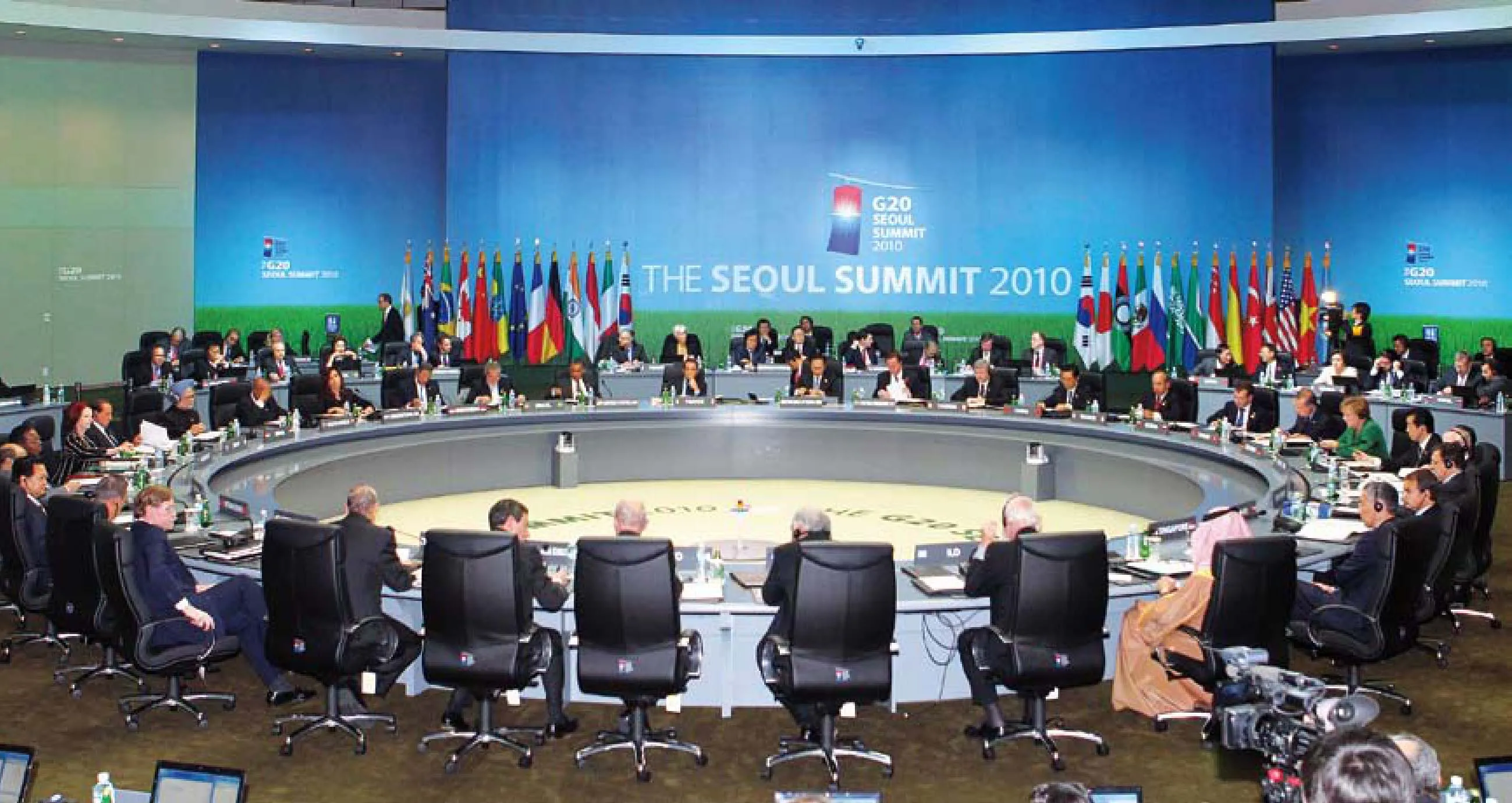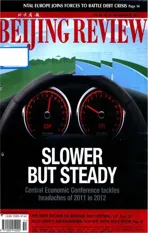The G20’s Commitment
2011-10-14ByHUYUE
By HU YUE
The G20’s Commitment
By HU YUE
The top developed and emerging countries vowed coordinated efforts to revitalize the global economy
As they join hands on the macroeconomic front, the G20 countries are trying to brush away the clouds hanging over the global economy.
“Some of us are experiencing strong growth, while others face high levels of unemployment and sluggish recoveries. Uneven growth and widening imbalances are fueling the temptation to diverge from global solutions into uncoordinated actions. However, uncoordinated policy actions will only lead to worse outcomes for all,” the G20 stated in a joint communiqué on November 12 closing the two-day Seoul summit held in South Korea.
This was the fifth gathering of the G20 leaders since they first met in Washington,D.C. in November 2008 when the fi nancial crisis was just starting to sweep the globe.
The G20 was established in 1999 to bring together strategically important industrialized and developing economies to discuss key issues in the global economy. Together, the G20 members represent around two thirds of the world’s population, 90 percent of global GDP and 80 percent of world trade.
“We recognize the importance of addressing the concerns of the most vulnerable.To this end, we are determined to put jobs at the heart of the recovery, to provide social protection, decent work and also to ensure accelerated growth in low income countries,”said the communiqué.
The summit called on member countries to move toward more market-determined exchange rate systems, enhance exchange rate fl exibility to re fl ect underlying economic fundamentals, and refrain from competitive devaluation of currencies.
Obviously, the U.S. position has been undermined by its own recent quantitative easing policy that threatens to weaken the greenback and trigger a flood of speculative capital into the emerging markets, Xiang Songzuo,Deputy Director of the International Monetary Institute at the Renmin University of China,told Xinhua News Agency.
Emerging economies fret they will be left vulnerable to a crash if the speculators later pulled out their money abruptly, he said.
A major irritant in the run-up to the summit was Washington’s proposal to set numerical targets for current account de fi cits and surpluses in a bid to address global economic imbalances. U.S. Treasury Secretary Timothy Geithner even suggested that countries should implement policies to reduce their current account imbalances below a speci fi ed share of national output.
Instead, the G20 leaders only agreed to draw up “indicative guidelines” to reduce unsustainable imbalances, and left the details to be discussed in the fi rst half of next year.
The international community also raised doubts about the feasibility of the U.S. proposal. German Economic Minister Rainer Bruederle warned of falling back into“planned economic thinking,” while China’s Foreign Ministry spokesman Ma Zhaoxu said the numerical target is unrealistic and unfair to developing countries.
As the size of a sustainable current account imbalance cannot be the same for advanced and developing economies and countries that are oil exporters, it was not practicable to set uniform targets like linking the size of a surplus or deficit to the GDP,said Dominique Strauss-Kahn, Managing Director of the IMF.
Needed coordination
When the fi nancial crisis drained the life out of the world economy in 2008, the G20 managed to put their differences aside and rolled out coordinated stimulus packages in the London summit in April 2009. This was even hailed by many economies as a new model of global economic cooperation.
Two years later, the urgency to act as one seems to have faded. The policy unity also faces challenges as member countries find themselves in difference stages of recovery.
The global recovery is proceeding better than expected but at varying speeds—tepidly in many advanced economies and solidly in most emerging and developing economies,said the IMF in an October report.
“Better growth prospects in many emerging economies have triggered a resurgence of capital in fl ows, igniting the risk of in fl ation pressure and asset bubbles,” said the report.“Meanwhile, growing sovereign risks in Europe could undermine the fi nancial stability gains and extend the crisis.”
The G20 has since clashed over a string of issues including the withdrawal of stimulus, currency valuation and trade imbalances.For example, the United States and Europe have sparred over a proper timing of stimulus withdrawal. The Obama administration in September 2010 unveiled a $350-billion stimulus package including infrastructure spending and tax cuts.
“In the past, stimulus was too quickly withdrawn and resulted in renewed hardships and recession,” said U.S. President Barack Obama.
This put it on a collision course with Germany, France and the UK, among others,who have promised to cut budgets amid rising debt worries.
“The international community united as one spirit during the crisis,” said South Korean President Lee Myung Bak. “But now there are doubts over whether such cooperation can be achieved since the global economy is entering a recovery phase, with each country growing at a different pace.”
The expanded number of voices at the table after the G20 replaced the G7 as the leading body to manage the global economy may help explain the increased noise, said Michael Paulus, Managing Director of Asia Public Sector Group at Citigroup Inc. in Hong Kong.
“When you’ve got 20 members that are trying to agree on something, it is much harder when there were seven,” he said.
Since the global recovery remains fragile,G20 leaders need to look beyond their own economies and stand fi rmly together against the uncertainties, said Ba Shusong, a senior economist at the Development Research Center of the State Council.

SEARCHING FOR SOLUTIONS:G20 leaders discuss the state of the global economy.The G20 Seoul summit concluded on November 12,where the leaders vowed to accelerate the global recovery by cooperating and coordinating efforts
A strong boost
Although lacking in detail, it is hard to deny that the agreements in Seoul came as a needed boon for the world economy.
In the joint communiqué, the G20 countries recognized the vital role of small and medium-sized enterprises (SMEs) in employment and income generation. Canada,South Korea, the United States and the Inter-American Development Bank jointly committed $528 million to help SMEs through grants and co- fi nancing.
In another move, the G20 aimed to support country-led green growth policies and facilitate energy ef fi ciency and clean energy technologies. It also confirmed the shift of over 6 percent in IMF quota shares from advanced economies to emerging ones, and called for deeper reforms to shape a more legitimate, credible and effective IMF.
When G20 countries face the undue burden of adjustment, policy responses in emerging market economies with adequate reserves and increasingly overvalued fl exible exchange rates may also include carefully designed macro-prudential measures, said the communiqué. Many economists believed this was a hint of allowing emerging economies to set up capital controls and stem the tide of capital in fl ows.
Another bright spot was a deep commitment to keeping markets open and liberalizing trade and investments.
“We will refrain from introducing and oppose protectionist trade actions in all forms and recognize the importance of a prompt conclusion of the Doha negotiations,” said the communiqué.
Next year, 2011, is a critical window of opportunity, albeit narrow, to round things off, it added.
WTO members started the Doha round of global trade talks in 2001, with a mandate to help poor countries prosper through more trade. But the negotiations have long been stalled because of sharp disagreements over farm trade subsidies and industrial market access.
“The fear we should all have is a return to what happened in the 1930s—protectionism,trade barriers, currency wars, countries pursuing ‘beggar my neighbor’ policies—trying to do well for themselves but not caring about the rest of the world,” said British Prime Minister David Cameron.
In a recent report, the WTO said G20 countries had continued to exercise restraint in imposing new restrictions since their last summit in Toronto at the end of June. New measures, increasing but at a slower rate,covered 0.3 percent of G20 imports and 0.2 percent of the total world imports, it said.
“Cohesion and cooperation defined the G20 during the crisis. This allowed decisive policy action to help avert a second Great Depression,” said Dominique Strauss-Kahn,Managing Director of the IMF. “Now, the challenge is to secure the recovery and to create the growth and jobs that the world needs.We all recognize that much remains to be done but the Seoul Action Plan is a step in the right direction.”
